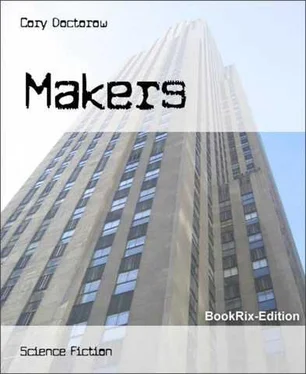Cory Doctorow - Makers
Здесь есть возможность читать онлайн «Cory Doctorow - Makers» весь текст электронной книги совершенно бесплатно (целиком полную версию без сокращений). В некоторых случаях можно слушать аудио, скачать через торрент в формате fb2 и присутствует краткое содержание. Жанр: Фантастика и фэнтези, на английском языке. Описание произведения, (предисловие) а так же отзывы посетителей доступны на портале библиотеки ЛибКат.
- Название:Makers
- Автор:
- Жанр:
- Год:неизвестен
- ISBN:нет данных
- Рейтинг книги:4 / 5. Голосов: 1
-
Избранное:Добавить в избранное
- Отзывы:
-
Ваша оценка:
- 80
- 1
- 2
- 3
- 4
- 5
Makers: краткое содержание, описание и аннотация
Предлагаем к чтению аннотацию, описание, краткое содержание или предисловие (зависит от того, что написал сам автор книги «Makers»). Если вы не нашли необходимую информацию о книге — напишите в комментариях, мы постараемся отыскать её.
Makers — читать онлайн бесплатно полную книгу (весь текст) целиком
Ниже представлен текст книги, разбитый по страницам. Система сохранения места последней прочитанной страницы, позволяет с удобством читать онлайн бесплатно книгу «Makers», без необходимости каждый раз заново искать на чём Вы остановились. Поставьте закладку, и сможете в любой момент перейти на страницу, на которой закончили чтение.
Интервал:
Закладка:
Cory Doctorow
MAKERS
PART I
Suzanne Church almost never had to bother with the blue blazer these days. Back at the height of the dot-boom, she’d put on her business journalist drag — blazer, blue sailcloth shirt, khaki trousers, loafers — just about every day, putting in her obligatory appearances at splashy press-conferences for high-flying IPOs and mergers. These days, it was mostly work at home or one day a week at the San Jose Mercury News’s office, in comfortable light sweaters with loose necks and loose cotton pants that she could wear straight to yoga after shutting her computer’s lid.
Blue blazer today, and she wasn’t the only one. There was Reedy from the NYT’s Silicon Valley office, and Tribbey from the WSJ, and that despicable rat-toothed jumped-up gossip columnist from one of the UK tech-rags, and many others besides. Old home week, blue blazers fresh from the dry-cleaning bags that had guarded them since the last time the NASDAQ broke 5,000.
The man of the hour was Landon Kettlewell — the kind of outlandish prep-school name that always seemed a little made up to her — the new CEO and front for the majority owners of Kodak/Duracell. The despicable Brit had already started calling them Kodacell. Buying the company was pure Kettlewell: shrewd, weird, and ethical in a twisted way.
“Why the hell have you done this, Landon?” Kettlewell asked himself into his tie-mic. Ties and suits for the new Kodacell execs in the room, like surfers playing dress-up. “Why buy two dinosaurs and stick ’em together? Will they mate and give birth to a new generation of less-endangered dinosaurs?”
He shook his head and walked to a different part of the stage, thumbing a PowerPoint remote that advanced his slide on the jumbotron to a picture of a couple of unhappy cartoon brontos staring desolately at an empty nest. “Probably not. But there is a good case for what we’ve just done, and with your indulgence, I’m going to lay it out for you now.”
“Let’s hope he sticks to the cartoons,” Rat-Toothed hissed beside her. His breath smelled like he’d been gargling turds. He had a not-so-secret crush on her and liked to demonstrate his alpha-maleness by making half-witticisms into her ear. “They’re about his speed.”
She twisted in her seat and pointedly hunched over her computer’s screen, to which she’d taped a thin sheet of polarized plastic that made it opaque to anyone shoulder-surfing her. Being a halfway attractive woman in Silicon Valley was more of a pain in the ass than she’d expected, back when she’d been covering rustbelt shenanigans in Detroit, back when there was an auto industry in Detroit.
The worst part was that the Brit’s reportage was just spleen-filled editorializing on the lack of ethics in the valley’s board-rooms (a favorite subject of hers, which no doubt accounted for his fellow-feeling), and it was also the crux of Kettlewell’s schtick. The spectacle of an exec who talked ethics enraged Rat-Toothed more than the vilest baby-killers. He was the kind of revolutionary who liked his firing squads arranged in a circle.
“I’m not that dumb, folks,” Kettlewell said, provoking a stagey laugh from Mr Rat-Tooth. “Here’s the thing: the market had valued these companies at less than their cash on hand. They have twenty billion in the bank and a 16 billion dollar market-cap. We just made four billion dollars, just by buying up the stock and taking control of the company. We could shut the doors, stick the money in our pockets, and retire.”
Suzanne took notes. She knew all this, but Kettlewell gave good sound-bite, and talked slow in deference to the kind of reporter who preferred a notebook to a recorder. “But we’re not gonna do that.” He hunkered down on his haunches at the edge of the stage, letting his tie dangle, staring spacily at the journalists and analysts. “Kodacell is bigger than that.” He’d read his email that morning then, and seen Rat-Toothed’s new moniker. “Kodacell has goodwill. It has infrastructure. Administrators. Physical plant. Supplier relationships. Distribution and logistics. These companies have a lot of useful plumbing and a lot of priceless reputation.
“What we don’t have is a product. There aren’t enough buyers for batteries or film — or any of the other stuff we make — to occupy or support all that infrastructure. These companies slept through the dot-boom and the dot-bust, trundling along as though none of it mattered. There are parts of these businesses that haven’t changed since the fifties.
“We’re not the only ones. Technology has challenged and killed businesses from every sector. Hell, IBM doesn’t make computers anymore! The very idea of a travel agent is inconceivably weird today! And the record labels, oy, the poor, crazy, suicidal, stupid record labels. Don’t get me started.
“Capitalism is eating itself. The market works, and when it works, it commodifies or obsoletes everything. That’s not to say that there’s no money out there to be had, but the money won’t come from a single, monolithic product line. The days of companies with names like ’General Electric’ and ’General Mills’ and ’General Motors’ are over. The money on the table is like krill: a billion little entrepreneurial opportunities that can be discovered and exploited by smart, creative people.
“We will brute-force the problem-space of capitalism in the twenty first century. Our business plan is simple: we will hire the smartest people we can find and put them in small teams. They will go into the field with funding and communications infrastructure — all that stuff we have left over from the era of batteries and film — behind them, capitalized to find a place to live and work, and a job to do. A business to start. Our company isn’t a project that we pull together on, it’s a network of like-minded, cooperating autonomous teams, all of which are empowered to do whatever they want, provided that it returns something to our coffers. We will explore and exhaust the realm of commercial opportunities, and seek constantly to refine our tactics to mine those opportunities, and fill our hungry belly. This company isn’t a company anymore: this company is a network, an approach, a sensibility.”
Suzanne’s fingers clattered over her keyboard. The Brit chuckled nastily. “Nice talk, considering he just made a hundred thousand people redundant,” he said. Suzanne tried to shut him out: yes, Kettlewell was firing a company’s worth of people, but he was also saving the company itself. The prospectus had a decent severance for all those departing workers, and the ones who’d taken advantage of the company stock-buying plan would find their pensions augmented by whatever this new scheme could rake in. If it worked.
“Mr Kettlewell?” Rat-Toothed had clambered to his hind legs.
“Yes, Freddy?” Freddy was Rat-Toothed’s given name, though Suzanne was hard pressed to ever retain it for more than a few minutes at a time. Kettlewell knew every business-journalist in the Valley by name, though. It was a CEO thing.
“Where will you recruit this new workforce from? And what kind of entrepreneurial things will they be doing to ’exhaust the realm of commercial activities’?”
“Freddy, we don’t have to recruit anyone. They’re beating a path to our door. This is a nation of manic entrepreneurs, the kind of people who’ve been inventing businesses from video arcades to photomats for centuries.” Freddy scowled skeptically, his jumble of grey tombstone teeth protruding. “Come on, Freddy, you ever hear of the Grameen Bank?”
Freddy nodded slowly. “In India, right?”
“Bangladesh. Bankers travel from village to village on foot and by bus, finding small co-ops who need tiny amounts of credit to buy a cellphone or a goat or a loom in order to grow. The bankers make the loans and advise the entrepreneurs, and the payback rate is fifty times higher than the rate at a regular lending institution. They don’t even have a written lending agreement: entrepreneurs — real, hard-working entrepreneurs — you can trust on a handshake.”
Читать дальшеИнтервал:
Закладка:
Похожие книги на «Makers»
Представляем Вашему вниманию похожие книги на «Makers» списком для выбора. Мы отобрали схожую по названию и смыслу литературу в надежде предоставить читателям больше вариантов отыскать новые, интересные, ещё непрочитанные произведения.
Обсуждение, отзывы о книге «Makers» и просто собственные мнения читателей. Оставьте ваши комментарии, напишите, что Вы думаете о произведении, его смысле или главных героях. Укажите что конкретно понравилось, а что нет, и почему Вы так считаете.








